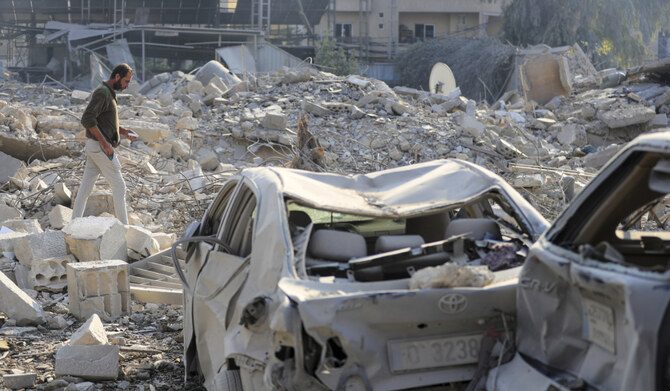BEIRUT: Lebanon’s Health Ministry said on Saturday that seven people, including a child and a pregnant woman, were killed and 46 others injured in Israeli strikes on the southern city of Tyre the previous day, with rescuers still searching for those missing under the rubble.
Repeated airstrikes on the city’s neighborhoods brought down buildings, trapping residents.
The strikes hampered civil defense rescue efforts during the night. Rescuers resumed work early on Saturday in search of the missing.
Israeli airstrikes on the city of Nabatieh devastated one of the country’s most important heritage homes owned by the late former minister Rafiq Shaheen.
Another heritage home belonging to Kamal Daher, which previously served as the headquarters for the Cultural Council of South Lebanon, was also destroyed.
Airstrikes targeting the western Bekaa region killed six people.
Hezbollah continued its military operations, and Israeli media reported in the afternoon that several rockets landed in Metula, damaging a house.
The group said it targeted a military gathering on the border of the settlement.
Airstrikes on the south continued along with Hezbollah’s responses.
Mohammed Shamseddine, a researcher from Information International, said that Israel had so far destroyed 22 border towns out of 29 locations along the 120 km front stretching from Ras Al-Naqoura in the west, through the western and central sectors, and reaching the Shebaa farms in the east, near the Syrian border.
Shamseddine accused Israel of “adopting a scorched-earth policy in these areas.”
He said Israel was “destroying everything and leaving no signs of life to prevent residents from returning to any potential settlement in the future.”
Shamseddine estimated that up to 44,000 housing units had been destroyed, with the cost of reconstruction reaching $4.2 billion.
Hostilities continued as the Supreme Islamic Shariah Council emphasized Lebanon’s need to “restore its decision, role, power, and status, and implement the constitution and the Taif agreement.”
The council said that it stands by “caretaker Prime Minister Najib Mikati’s efforts to overcome the ordeal faced by Lebanon and contain the consequences of the Israeli aggression against the country.”
The council’s stance came on the eve of Miktai’s departure for Riyadh to take part in the extraordinary summit of the Organization of Islamic Cooperation.
Saudi Arabia is convening the talks to address Israel’s aggression in Gaza and Lebanon, as well as the resulting devastation.
The Shariah Council, which includes all Sunni segments, called for “the need to live within the state, accept the idea of the state, respect its laws and constitution, and subject oneself to its authority.”
The council said that “outside the state, we are conflicting groups, communities, and tribes,” adding that “the state of the constitution, institutions, and human dignity can save Lebanon and restore its economic stability, advancement, and prosperity.”
The council, led by Lebanon’s Grand Mufti Sheikh Abdul Latif Derian, met on Saturday with Mikati.
It called on the UN Security Council to “secure an immediate ceasefire in Lebanon, compel Israel to implement the ceasefire, and apply the UN Charter, which calls for pacific settlement of disputes.”
It added that Israel no longer abided by the charter, and should lose its UN membership.
The Shariah Council urged “the Security Council to answer the Lebanese state’s call and immediately implement UN Resolution 1701 in full, thereby ensuring the end of the war and enabling the Lebanese armed forces to exercise their national right to defend Lebanon, while providing them with all the capabilities and possibilities to fulfill this role.”
The council criticized Hezbollah’s support indirectly, saying that “what has happened and is still happening now is a challenging test that we hope we have learned from, as it has led to the destruction of the whole country.”
The council urged “the state, with all its institutions, and all Lebanese to support the displaced people, provide them with resilience and health care means, and preserve civil peace.”
Israeli hostilities against Lebanon escalated in the past 24 hours.
A video featuring several Israeli soldiers invading houses in southern Lebanon was shared on social media, prompting widespread anger among Lebanese.
Israeli media reported on Saturday afternoon that explosions were heard after sirens sounded in the Krayot and Western Galilee, adding that Hezbollah fired 10 rockets targeting Nahariya, Acre, and Krayot.
Hezbollah said that it shot down a Hermes 450 drone with a surface-to-air missile over Deir Seriane and that Israeli warplanes attacked the town.
The southern suburbs of Beirut and the southern region experienced intense Israeli assaults from Friday night into early Saturday.
For two hours, 14 airstrikes targeted the southern suburbs of Beirut.
Targeted locations included Hadath, Burj Al-Barajneh, Haret Hreik, and the Al-Jamous neighborhood, with operations extending to the area surrounding the Lebanese University building in Hadath.
Israeli army spokesperson Avichay Adraee said that the “airstrikes, guided by precise intelligence from the military intelligence agency, targeted command centers, a weapons production site, and other infrastructure belonging to the terrorist organization Hezbollah in the southern suburbs of Beirut.”
The assertion made by the Israeli army that it avoids targeting civilians by issuing prior evacuation warnings did not hold for the southern region, particularly in Tyre.































